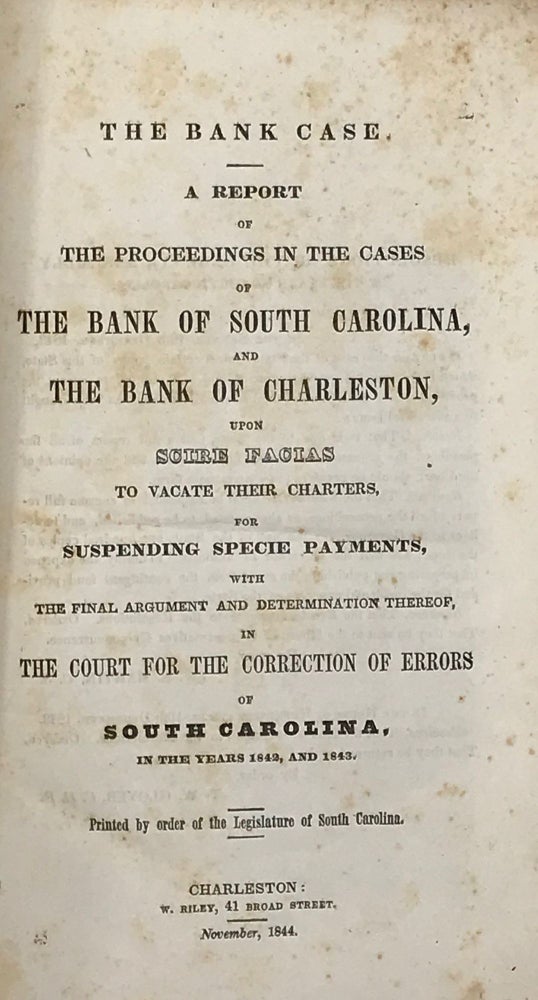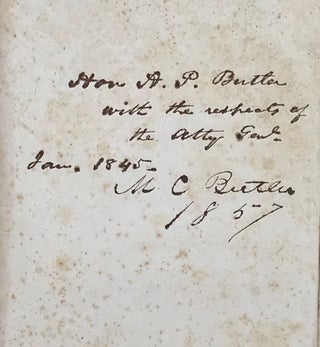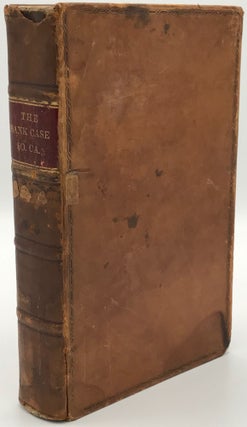THE BANK CASE: A Report on the Cases of the Bank of South Carolina and the Bank of Charleston, upon "Scire Facias" to Vacate Their Charters, for Suspending Specie Payments, with the Final Argument and Determination thereof, in the Court for the Correction of Errors of South Carolina, in the Years 1842, and 1843. Printed by order of the Legislature of South Carolina.
Charleston, (SC): W. Riley, November 1844. First edition. Large 8vo. v, (2), 550 pp. Speculation helped create the Panic of 1837 which was followed by five years of recession, during which time business and farming bankruptcies were common and banks across the nation failed. The Bank of South Carolina and the Bank of Charleston suspended specie payments several times, the last in 1840, resulting in the legislature passing new regulations; the state took the banks to trial, the revocation of their charters hanging in the balance. The judge in the case, A. P. Butler (whose copy of "The Bank Case" this is) ruled for the banks but the decision was reversed on appeal. However, since by that time the banks had resumed specie payments, the general assembly passed new legislation allowing the banks to keep their charters, so long as they abided by the new regulations. For a detailed consideration of this case, see W.A. Clark's "The History of Banking Institutions in South Carolina Prior to 1860" (Columbia, S.C., 1922). "State of South Carolina initiates action against two banks for failure to comply with Act of 1840" (OCLC; rather widely held, citing about 40 locations). Sabin 87448. American Imprints 44-356. Goldsmiths'-Kress 33846.39. Cohen 11229. Turnbull II, p.489. Rather persistent light foxing, but a very good copy with an excellent double-South Carolina association, including a presentation inscription from the state's attorney general to the judge who oversaw these controversial trials. Contemporary sheep (spine ends a little chipped, joints showing some wear), ornamental scroll framing the boards, leather spine label (another, paper spine label almost entirely removed, "1843" in ink on spine). (10767). Item #64421
Inscribed on the front pastedown "Hon. A. P. Butler / with the respects of the Atty Genl. [Henry Bailey] / Jan. 1845." and signed just below the inscription "M. C. Butler / 1857." Andrew Pickens Butler (1797-1857) was a South Carolina lawyer and judge who served in the U.S. Senate, 1846-1857, supporting the interests of the slaveholding states from his position as chairman of the judiciary committee. Butler was the presiding judge at the trials for these two cases, finding for the banks, but being overturned in each case. Bailey (1799-1849; SC Attorney General, 1836-1848) took these cases to court and was ultimately successful in their prosecution. Matthew Calbraith Butler (1836-1909), nephew of A. P. Butler and of Oliver Hazard and Matthew Calbraith Perry, a young lawyer just before the Civil War began, raised a company in Edgefield for the Hampton Legion, becoming its captain; he served through the conflict, losing a foot at Brandy Station and rising to major general in command of a division by war's end. Active in state politics after the war, he was elected to the U. S. Senate, serving, 1877-1895. For long articles on both of the Butlers, see their entries in the DAB.
Price: $1,500.00



